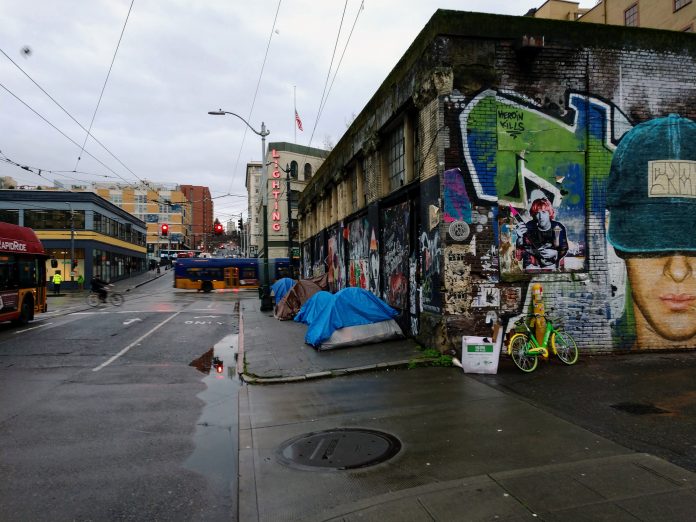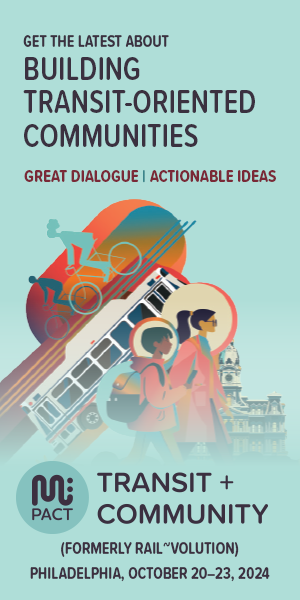As the affordability crisis in the Puget Sound region pushes more of our neighbors on the street, law makers and advocates continue to search for humane and cost effective ways to end unsheltered homelessness. House Bill 1591, the ‘Homelessness Bill of Rights’ works towards this goal, through protecting the basic constitutional rights of individuals with no alternative besides sleeping in public.
The text of the bill is straightforward — cities within Washington should stop criminalizing homelessness, allowing them to redirect funds spent on enforcement and incarceration towards investments in evidence-based practices for ending homelessness, such as supportive housing. This approach is based on multiple studies showing that the criminalization of homelessness is counterproductive, as well precedents from around the country and the world. Although so called ‘quality of life’ laws aimed at clearing our streets and plazas of public displays of poverty have recently grown in popularity, they are frequently challenged in court and often struck down as unconstitutional. HB 1591 thus builds upon current judicial decisions and helps protect Washington municipalities from potential lawsuits.
Despite these benefits, the bill has faced pushback. Reiterating the civil rights of those experiencing homelessness requires us to confront deeply seated social stigmas, and ask hard questions about what has forced hundreds of thousands of individuals to live in third world conditions in a region with one of the nation’s premier economic engines. This stirs fears in some that protecting those forced to live in public view could lead to safety and health concerns in these spaces. HB 1591 did not pass out of committee before the cutoff for legislation this session, and the coalition which authored the legislation is now examining how to incorporate thoughtful community outreach and best practices into the next draft.
The bill’s sponsor, Rep. Mia Gregerson (SeaTac-D), has seen the impact of the region’s affordability crisis for longer than most. As a native of SeaTac, she saw the impact of rising rents and stagnant wages in her largely working class district before more affluent neighborhoods to the north began to feel the pressures of displacement. When King County declared a homelessness state of emergency in 2015 she was already familiar with the human toll. To address the crisis, Rep. Gregerson reached out to a diverse set of affordable housing and homelessness experts to ask what policies they felt would be most effective. Sara Rankin, a law professor and director of the Homelessness Rights Advocacy Project at Seattle University advocated for a “Homelessness Bill of Rights.”
The movement for reiterating the rights of homeless individuals in official legislation has already taken root in Europe and in other areas of the US. In June 2012, Rhode Island passes first mainland US Homeless Bill of Rights. Illinois, Connecticut and Baltimore MA have since passed their own versions, and similar legislation is being considered by California, Hawaii, Oregon, Vermont Missouri and Massachusetts. The specifics of each bill vary in the amount of investment they require in providing positive rights such as access to shelter, sustenance, or health care. However the main goal of all is to protect vulnerable citizens from discrimination and harassment.
The idea has recently gained prominence in response to the Martin v. Boise case. On September 4, 2018, the 9th Circuit Court of Appeals found that laws that criminalize homelessness amount to cruel and unusual punishment. The ruling states that the government may not “criminalize conduct that is an unavoidable consequence of being homeless—namely sitting, lying, or sleeping on the streets” when there is an absence of other adequate alternatives. The state must provide alternatives that are “practically accessible”, meaning that there are enough shelter beds available for the homeless population, and they must accommodate and individual’s restrictions such as disabilities and religious concerns.
While advocates had already been pointing out the need for additional protections for the homelessness, this new legal challenge to anti-homelessness laws sped up the process. “The State runs off of lawsuits.” Rep. Gregerson said. “Being part of 9th circuit court Washington is very vulnerable to lawsuits as a result of not providing reasonable alternatives to those who are sleeping on the street. Martin v. Boise is a call to action for us to start working towards a more humanitarian approach.”
HB 1591 addressed the concerns of activists and the need for updating municipal enforcement practices to be in line with this new ruling. One of the more contentious elements of the bill has been the definition of harassment. Some residents who are in favor of sweeping homeless encampments try to imply that this would prevent law enforcement agents from so much as talking to homeless individuals. Contrary to these concerns, the current version of the bill does not create a special class of homeless individuals. They are not allowed to any public spaces that obstruct the flow of traffic or aren’t already open to public. It merely requires cities to offer reasonable alternatives to homelessness (including shelter) before fining or incarcerating individuals for their presence in the public realm.
For her part, Rep. Gregerson is most concerned about making sure the policy is human. “I get the public health issue,” she said. “It just as important that our children can play at a park without needles as that people don’t have all of their belongs ‘swept’ and destroyed — and then we wonder why they have mental health issues!”
Social rights, such as the right to shelter, are sometimes referred to as “positive rights” because they create new government obligations or actions. Negative rights, on the other hand, are protections from state interference or intrusion. While it may initially appear that positive rights cost taxpayers more, it is important to remember that while positive rights depend on the construction of social goods — housing for example — negative rights can also be expensive to enforce, as they require the deployment of additional police officers and incarceration.
Studies show that criminalizing homelessness is expensive and ineffective: Seattle and Spokane spent at least $3.7 million on “criminalization” ordinances that disproportionately impact homeless people, resulting in fines, jail time, and other engagement with law enforcement over a five-year period. This is money that could have been invested in non-punitive alternatives, which are shown to be more cost effective solutions to homelessness.
Criminalization also imposes additional barriers to an individual’s ability to finding stable housing: a delay in paying a fine for a non-violent crime such is loitering or, in Seattle, fines for sleeping in your own vehicle, can lead to a criminal record, and incarceration. These efforts are self-defeating: a criminal record adds further barriers to finding a job, accessing shelter and food. This makes homeless people more likely to remain on the street, become ill, self-medicate and even die. The impact of these laws make clear that they are not an effort to address homelessness but rather to hide the uncomfortable problem from those who are already housed.
“When you keep people out of the criminal justice system and you let them thrive than we can spend that same money in more productive ways,” Rep. Gregerson said. “Permanent stable housing is important. Having a tent between I-5 is not environmentally healthy. We are investing millions of dollars in affordable housing but in the meantime we need to make sure those who are most vulnerable remain protected.”
In the next session, Gregerson plans to keep working towards this goal through passing a budget provision for a study or report so the legislature can better understand the impact of decriminalizing homelessness. In addition, she said she will work with community partners and the civil rights judiciary committee to provide suggestions and to legislature to consider.
Almost by definition, a crisis is not something that has an easy answer. However the ongoing movement towards enacting a Homeless Bill of Rights provides all of us an opportunity to confront our deep-rooted biases against the most vulnerable members of our society. Creating an inclusive relationship between the housed and the homeless and acknowledging our equal right to use public space (for recreation or for necessary life-sustaining activities) is the first step towards making this vision a reality.

Becca Book (Guest Contributor)
Becca Book is an urban designer at Mithun, where she pursues projects that promote resilient and healthy communities. To further this goal she is part of the American Institute of Architects Committee on Homelessness. In her free time (or lack thereof) she also enjoys bike touring, track cycling, cyclocross and some times even road cycling.




